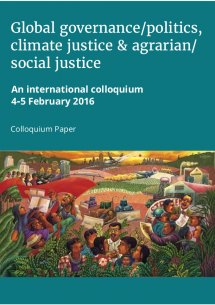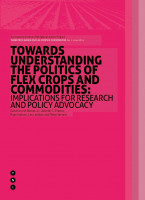Flexibilising global agri-biomass value chains: a techno-market fix for resource burdens? Colloquium Paper No. 7
An eco-efficient bioeconomy, combining environmental sustainability and economic advantage, has been promoted to alleviate resource constraints of rising global demand. For political forces resisting environmental degradation and people’s dispossession, several means are necessary to contest this global agenda and counterpose alternatives.

Downloads
Authors
An eco-efficient bioeconomy, combining environmental sustainability and economic advantage, has been widely promoted to alleviate resource constraints of rising global demand. A sustainable future supposedly lies in an ‘integrated, diversified bio refinery’, which would more efficiently process various non-food biomass. Thanks to future technology, these renewable resources would be converted in more efficient, diverse ways. In parallel, the bioeconomy ‘value web’ concept anticipates a continuous flexibility in value chains; this has been promoted as a means to make production systems more resource efficient and economically competitive.
Political-economic elites have been seeking such flexibility through a techno-market fix, converging in a future biorefinery. This more flexible future is promoted as benefiting the global South by inserting producers into global markets and thus overcoming malnutrition. Such a win-win scenario can seem plausible only by blaming resource-inefficient methods for societal problems. Yet current technoscientific innovation towards resource-efficient biorefineries has the same drivers as previous innovations expanding global markets fo r food, feed, fuel, etc.
More efficient, flexible conversion of biomass will strengthen financial incentives to intensify resource extraction, undermine soil fertility, industrialise agri-forestry systems and dispossess nearby communities. For their economic viability, such techno-fixes depend on chea pening resource supplies without paying for their societal and environmental costs. Through a ‘value web’ of more flexible value chains, moreover, this agenda favours economic advantage for the upper parts of the global value chain (e.g. high-value products and proprietary know ledge), while driving the lower parts into greater competition to supply cheap biomass.
Beyond any tangible effects, the sustainability promise of eco-efficient biorefineries has a performative role. It naturalises current pr oduction-consumption patterns and expanding global markets as ‘consumer demand’ – as an external objective force to be accommodated by agro-industry. Techno-market fixes reinforce those patterns, regar dless of whether or when future technologies fulfil their promise of greater resource efficiency.
For political forces resisting environmental degradation and people’s dispossession, several means are necessary to contest this global agenda and counterpose alternatives.
* This paper was published as part of the 2 day Colloquium Global governance/politics, climate justice & agrarian/social justice and selected for republishing on the TNI website. All papers can be found at the website of ISS.

